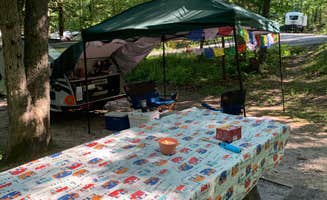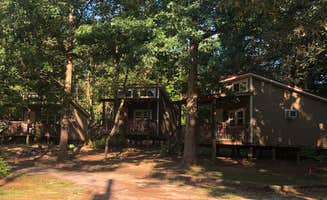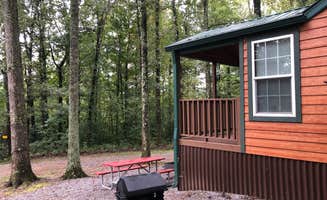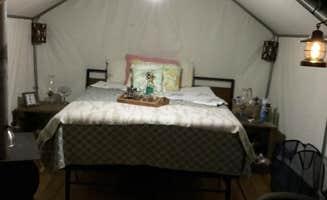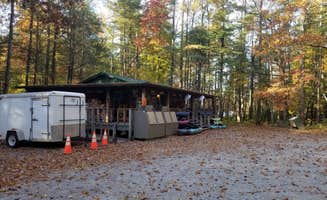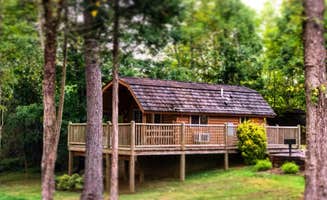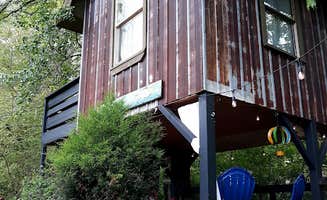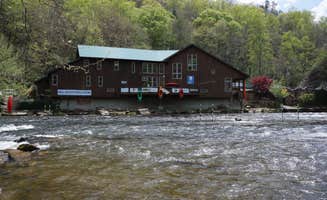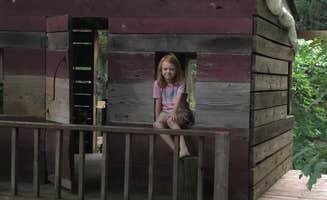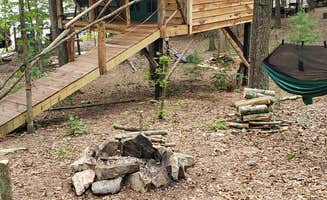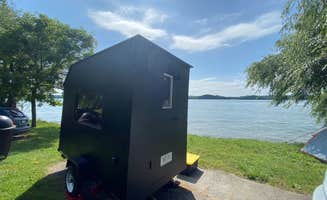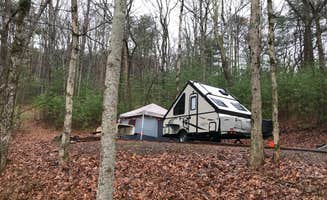Camping options near Etowah, Tennessee range from established campgrounds to rustic forest service sites across the Cherokee National Forest region. Located in the foothills of the Appalachian Mountains at approximately 850 feet elevation, the area experiences mild springs and falls with summer temperatures averaging 85-90°F during peak camping season. Winter camping can face occasional freezing temperatures, particularly at higher elevations along the Cherohala Skyway.
What to do
Waterfall hiking: 3 miles round trip. The Benton Falls trail at Chilhowee Recreation Area offers a moderate hike suitable for most skill levels. "The trails are what really makes this an all around great campground. Several hikes for all levels. We did the Benton Falls hike and it was lovely! 3 miles RT," notes Tracy J.
Lake activities: Morning fishing best. The swimming beach at Indian Boundary has designated areas for families. "There's a lake with a sandy area, and a beautiful mountain range to enjoy. It's my favorite camping spot!" shares Alison B. The water is calmer before 11am for fishing, as water releases increase current after mid-morning.
River rafting: Class III-V rapids. The Olympic whitewater course on the Ocoee River is accessible from campgrounds near Tellico Plains. "We did the Classic Middle Ocoee Rafting Adventure, with Leon as our guide. He was awesome! He wore a Viking helmet and had vast knowledge of the river," reports Lori H. from Adventures Unlimited Campground.
What campers like
Shower facilities: Hot water available. Campers appreciate the well-maintained bathhouses at campgrounds in the region. "The showers were clean, hot and great water pressure. Also, there was a restroom for every 6-7 sites, so not too much traffic," mentions Manie D. about facilities at Chilhowee Recreation Area.
Yurt camping: Solar power available. For those seeking yurt camping near Etowah, Tennessee, alternatives include glamping structures at several campgrounds. "We stayed in one of their cabins. We were on motorcycles. Couldn't have asked for better!!" explains Greg W. about Smitty's Lodge Motorcycle Campground.
Fire rings with grates: Free firewood at some sites. Many campgrounds provide cooking equipment with fire rings. "Fire pits with cooking grates, lantern posts and picnic tables were clean and well kept," notes Tracy J. Some sites even include free firewood for campers.
What you should know
Cell service: Very limited coverage. Most campgrounds have spotty or no service. "There is no WiFi or AT&T cellular signal in this park. However, if you drive to any of the scenic overlooks just outside the park, you will get AT&T LTE signal," advises Manie D. Verizon typically has better coverage throughout the region.
Road conditions: Narrow mountain access. Many campgrounds require navigating steep switchbacks. "To get to this campground you have to go up a steep narrow windy mountain road," warns Carissa D. GPS directions often route travelers incorrectly, so follow official campground directions.
Seasonal operations: Most closed November-March. Cades Cove Campground and others operate seasonally. "We camped here in November and didn't have a problem getting a site, but the place did fill up!" reports Buck R. Late fall offers changing leaves while avoiding summer crowds.
Tips for camping with families
Wildlife viewing: Early morning best. Cades Cove offers excellent wildlife spotting opportunities for children. "I have never seen more black bear. It was a very safe distance we watched them about a football field away across a field pretty amazing experience," shares Ashley Y. Visit at dawn or dusk for best viewing.
Swimming options: Designated beach areas. Several campgrounds feature kid-friendly swimming. "We even took a dip at the swimming area just a short drive from the campsite and loved that too!" reports Emerald M. from Chilhowee.
Bathroom proximity: Choose sites strategically. Families with young children should select sites near facilities. "We stayed at site #39. Next to the trail that leads to the lake. Next to rest room, trash bin, and water spout," recommends Heather W.
Tips from RVers
Hookup limitations: Water fill stations. Many campgrounds lack full hookups. "The RV sites do not have water hook-ups at each site. There is a water hook up to fill your tank as you enter the campsite area. Fill your tank and you are good to go," advises Nathan G. about Sweetwater KOA.
Site selection: Consider pad material. Camper pads vary in material and levelness. "Camper pads are crushed rock, which I think helps them to dry quickly, but did produce a LOT of mess going in and out of the camper," notes Manie D.
Dump station access: Limited availability. Most campgrounds have single dump stations with sometimes challenging access. "There is only one dump station and it's on the other side of the campground. From the B loop, you have to traverse about a 120 degree switchback to get to it," cautions Mike N.


